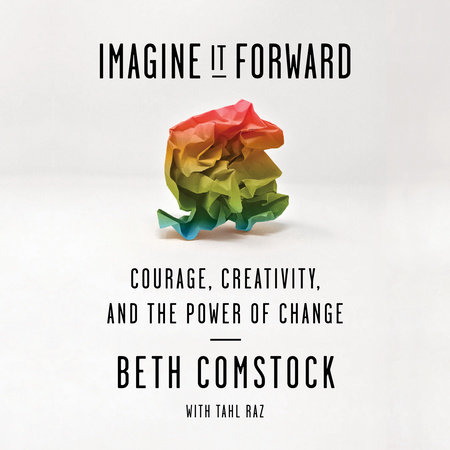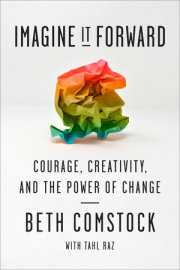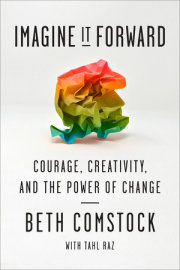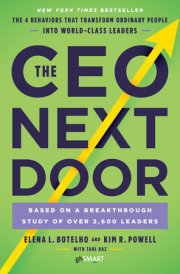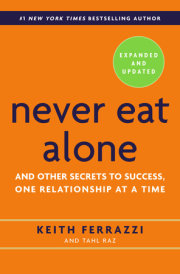Chapter 1
Reinvention
Taking Ownership of My Life
I was leading East Coast entertainment publicity at CBS—the “Tiffany Network”—when I got the call offering me the job as vice president of NBC News Media Relations.
People’s resistance to me taking the job—to even considering it—started immediately after I got the call. Totally crazy! Career suicide!
It was late at night as I considered the job, and the resistance from colleagues and friends to my taking it. I know it was late because that’s always the time when I try to create the logical rationale for a decision I’ve already made on instinct. The pros, the cons, every possible scenario. Morning came and the only clarity I had was emotional. I felt it in an almost spiritual way. I’m taking the job. I’m going back to NBC, where my career had started.
Only this time, in the fall of 1993, the network was a national disgrace.
We are hardwired to flee ambiguity, chaos, and the unknown. And yet here I was, running toward a disaster, embracing it. My colleagues and friends were sure it was professional ruin.
Not long before, the NBC news division’s Dateline program had aired “Waiting to Explode,” an investigative report that showed a sedan T-boning a Chevy pickup truck, with the truck erupting in a fiery explosion.
The problem was, the whole thing was a fake. An investigation revealed that NBC News had duct-taped model rocket engines to the truck’s frame and initiated the blast with a remote-control device. It took anchors Jane Pauley and Stone Phillips three and a half minutes to issue a full on-air apology—an eternity in TV time—and promise that “unscientific demonstrations” would never again be conducted by NBC.
But the Dateline crisis was just the latest in a string of NBC failures that included the highly public and embarrassing departure of David Letterman for CBS, and a ratings dive to third place among the networks. “Morale is in the toilet,” a veteran NBC producer told Entertainment Weekly at the time, in what became a months-long public flaying. “There’s nobody at the rudder.”
CBS was the ratings leader. Friends and colleagues thought I was crazy to leave. “I’m worried about you,” someone confided. A reporter from the Wall Street Journal was even more blunt: “NBC News is washed up.” Why would I leave the “Tiffany Network” for a demoralized number three?
And yet, in my gut, I knew this was the job I was meant to take.
Well-meaning colleagues will try to stop you from making these bravely instinctive choices. That’s just how it is. Change-making creates resistance. It is against the rules. Change is seen as loss. It is scary.
But you have to learn not to stop yourself. You have to learn to give yourself permission to imagine a better way, to envision opportunity where others see only risk.
It’s something I had to learn for myself.
Perhaps the best way to explain why I took the NBC job is to take you back to 1985, to tell you the kind of deeply personal story that doesn’t often appear in business books. In this story, I’m hiding behind a closed bedroom door, listening as my husband conveyed my first truly life-changing decision to my mother.
At the time I was in my midtwenties. I’d always followed the rules in my life, kept to the straight and narrow. I did very well in school, got involved in all kinds of clubs and community activities, and I astutely protected my “good girl” reputation. But I’d been beset by the growing realization that, like so many people, I had been keeping myself “small” by pleasing others and fitting in, by looking to see what everyone else was doing before acting, by making sure all I attempted was sanctioned, what nice girls do.
Conformity had created in me an insurmountable fear of being different, of putting myself out there. Every day I was killing off my true self with compromises.
The door was cold against my ear. My mother, at our house for the weekend to visit and care for our daughter, Katie, was sitting in the kitchen with my husband, Dave, as he told her something that I knew wouldn’t register: Dave and I were getting divorced. I had decided I needed to leave—without being able to say exactly why.
I was the woman who seemed to have it all at the time: a fancy new home near DC, a seemingly happy marriage to a handsome man of means, a new job as the NBC publicity coordinator, and a beautiful baby daughter. By every normal measure of success, I’d made it. Underneath that success, however, I was filled with despair.
Up to that moment, I’d lived my life more or less by someone else’s narrative. A simple story, with defined roles, that led to a simple happy ending. Elegant, without complications. But with every day that passed, I realized just how large the gap was between the story I was expected to follow and the life I actually wanted to live. While I had ideas—I wanted to be a television reporter, specifically a science reporter—mostly, I dreamed of setting out in the world. Once my father, who was a dentist then, convinced a patient, a news producer who commuted to DC, to have me shadow a reporter. (My dad, a big supporter of my future career, was not afraid to use his unique advantage of extracting promises for his kid while extracting a patient’s back molar.) As it turns out, I spent two hours with Diane Sawyer, then a young State Department reporter for CBS, just back from Chad. A few years later, sitting in the auditorium at my sister’s high school graduation soon after I graduated from college, I daydreamed of the career I’d surely have by the time she graduated from college. In my mind’s eye, I had the sophisticated worldliness of Diane Sawyer. What big city would I be living in? Would it be New York, where Diane had recently moved? What travel would I be returning from? Keep in mind that at this point I was working two jobs in Richmond—one as a Mexican-restaurant waitress to pay for my second, barely paying job as Jackie of all trades (and on-camera reporter) in a small news service covering the Virginia House of Delegates, which I had landed via a friend of a friend’s friend.
I was the daughter of a small-town dentist and a schoolteacher, and while my parents did well and afforded my sister, brother, and me opportunities, we were not wealthy, and certainly not well-connected. My father’s other aching-molar patients didn’t work in media. I jokingly call my mother “the mayor,” because she knows and talks to everyone; our town was our world. While working in the news service, I continued to seek out bigger jobs, perusing the want ads of Broadcasting magazine. That’s how I came to apply for TV meteorologist in Salisbury, Maryland, where I horribly mispronounced the name of the town as I did the on-set interview. In Richmond, I hounded a local TV station’s news director with my videotapes, calling him so relentlessly that he lost control. “You look like you’re 12,” Mr. Rant barked. “Why would I put anyone like you on camera?” My confidence was shaken, and my fear of striking out into the unknown had held me back. I was happy to say yes to getting married. I was in love and lacked the maturity to ask what that meant beyond saying no to pushing for jobs that would jump-start my career—jobs in TV markets beyond Richmond or Salisbury or locations as exotic as, well, Tulsa, where I had in fact been offered a job.
Dave’s outlook didn’t change as much as mine did after Katie was born. He still went out, had fun with his friends. I was the earnest wife, and now mother. In fairness to him, I had never declared that I wanted to be otherwise. In fact, I may not have known, or at least been able to articulate it. That was the worst part, being slowly caged by my own passivity. I had a growing, painful sense that another side of me needed to be released, and the only person standing in my way was me.
I don’t even remember the conversation we had in which Dave and I decided on a divorce. I initiated the process, but I don’t remember the words. I just knew: I. Can’t. Be. This. Until that moment, my fear had held me in place. I was worried about what my family would think, what my friends would think, what my colleagues would think. I was terrified of traumatizing my daughter. And I was deeply afraid of going against convention.
My mother, knowing me to be shy, had pushed me to be a joiner in my small town, where the ethos was to always say the “right thing.” That mentality followed me at school, with friends and teachers who encouraged me to do what I was told, do well, look good, and obey the rules. My school, like most, was pervaded by the myth that rewards are reserved for those who say “I know,” instead of reveling in “I don’t know” and learning to ask the probing questions.
Wading into the unknown just wasn’t a skill I had acquired yet as an ambitious but aimless twenty-three-year-old trying to shake off my limited perspective. So I gravitated to “what was done”: I got married to my college boyfriend, Dave. And then not long after, without planning it, I was pregnant. Everything was happening too fast. It was as if someone else was narrating my life.
The moment Katie was born, she created a love in me so strong that it yanked a fierce clarity from my depths. My vague despair morphed to a clear-eyed vision of a future that I knew had little to do with my present. I knew I had to chart my own course, be the captain of my soul. What was clear was that I had to go; what was less clear was where. I had fantasies of fleeing back to Richmond, Katie and me rooming with a high school friend. I was going to start over and this time get that job at the local TV station. When fantasies weren’t enough, I’d tell the babysitter that I was going out. I’d drive to the movie theater at the local mall and buy a ticket to an emotional movie like Terms of Endearment. And cry in the dark. Alone in every sense.
I came to see that—while incredibly hard—there was nothing shameful about endings or mistakes. It can be a wise decision to leave one path and choose another. Scary, yes, but it can be the first step to something better. And that itself was a massive insight for me: something better was a deliberate choice. Already I had a different perspective on reality.
Once I’d spoken the word divorce aloud, it didn’t feel like as much of a failure to me. I felt free, in a slightly terrified way. Finding the optimism to imagine a better future allowed me the courage I so desperately needed to move forward, as me.
Of course, my new life was no Eat Pray Love romantic journey, where I could shrug off my responsibilities in the quest for a sexy guru and the perfect cup of chai. I was choosing life as a single mom and just starting out in a career. I rented a little place of our own in Alexandria. I loved every square inch of that tiny house, even with all the pressures of motherhood and work and change. I had bills to pay. (I even had to take out a loan to hire a lawyer to “petition the court” to get my surname back.) I was alone. My baby Katie was crying. I was crying. It was scary. But it was also exhilarating. The thing I’d only imagined was now happening, and I was frozen in disbelief. Now what?
My future was now blank. I would have to write my own narrative. From now on, my story wouldn’t be so traditional, or perhaps so elegant, or simple. But that was the point. It was becoming clearer to me that the fullest lives were lived by people not afraid of complication, mistakes, or imperfection.
I threw myself into my work. Basking in my recently acquired publicity job at NBC’s Washington news bureau, I began to assert my ambition and test my boundaries.
GE bought NBC the month I started working there. I was hired as a publicity coordinator—a far cry from the globe-trotting television journalist I had wanted to be, but at least I was in the newsroom. (Way in the back, in a micro-cubicle near the filing room, where few people journeyed, but it was just perfect to me.) I had found my way there after a series of jobs, as administrative assistant in a cable television association and as a programming coordinator for cable access community television, like Mike Myers’s Wayne’s World but even wackier. With GE at the helm, things changed quickly. NBC started to employ GE efficiency, and there was a rash of layoffs. Before long I was in charge of the publicity department—actually, I was the department. My bosses recognized me as a quick learner, efficient and willing to take on and manage many projects at once, and someone with a growing portfolio of small accomplishments on which to stand. I put out a behind-the-scenes newsletter to share updates across the bureau; I organized new photos so that the journalists looked more contemporary; and after attending the morning editorial meetings, I pitched ideas to the few reporters in DC who covered media, building relationships that NBC hadn’t had earlier. For all my shyness, pitching reporters was now my job. That, and the fact that I could do it over the phone, gave me a much-needed dose of courage.
I began traveling to the New York NBC headquarters once a month. After spending time in New York, all I could think about was how much I wanted to work there.
In early 1988, I got a new boss, an ambitious former lobbyist named J.R. He had landed in the New York mothership, handling corporate communications. He knew that I wanted to be on a bigger stage as well and started to prepare me for the jump. Then, in December 1988, after the first of what would be many annoying negotiations with J.R., I was officially offered the job.
I suppose the decision to move to New York should have terrified me. I was leaving a place I knew, two hours from my parents’ house, for one of the largest cities in the world, where I had few friends, no family—and no increased salary to pay for my new life. I would have to get permission from Dave to move our daughter out of state. I was racked with guilt that would shadow me for years. But determined to look forward, I leapt off that cliff.
Copyright © 2018 by Beth Comstock. All rights reserved. No part of this excerpt may be reproduced or reprinted without permission in writing from the publisher.

